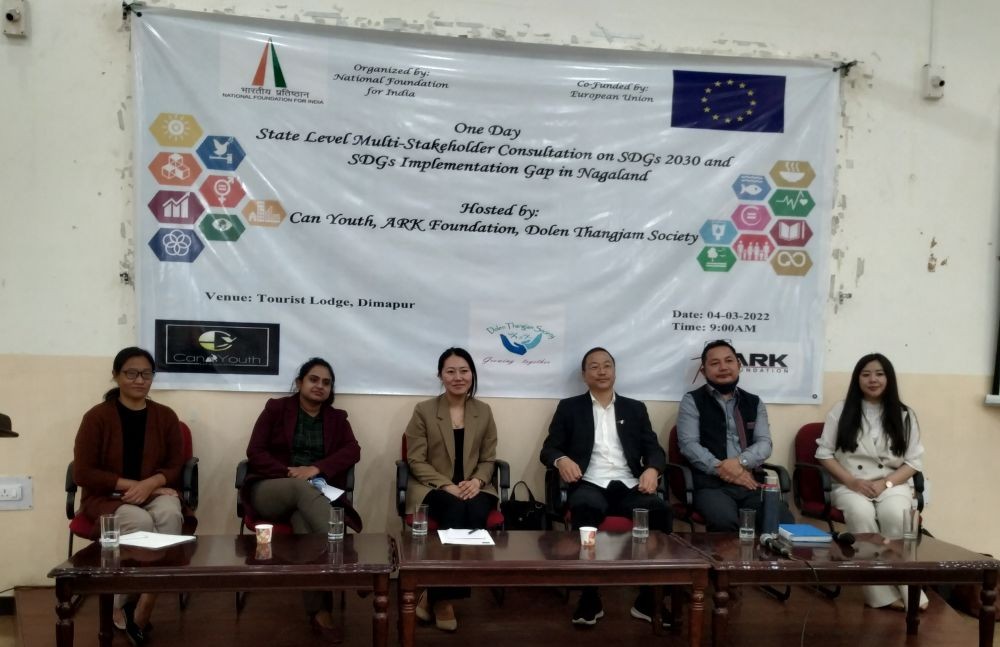The panelists during the one day ‘State Level Multi-Stakeholder Consultation on SDGs 2030 and SDGs Implementation gap in Nagaland’ held at the Tourist Lodge, Dimapur on March 4. (Morung Photo)

Morung Express News
Dimapur | March 4
Nagaland, to date, has seen the publication of three development-oriented “visions.” The dreams are big but a combination of certain factors, including but not limited to security, corruption, geographical isolation and connectivity has come in the way of achieving the goals.
It is believed that an inclusive approach in identifying the causes and narrowing the gaps would go a long way in strengthening the effort in realizing the envisioned development targets.
These issues formed the basis of a panel discussion on ‘SDGs 2030 and SDGs implementation Gap in Nagaland’ organised by the National Foundation of India, in partnership with Can Youth, ARK Foundation and Dolen Thangjam Society, in Dimapur on March 4. It also seeks to “create a space for dialogues” between government, media, academia, civil society organisations, non-governmental organisations and youth leaders “with mutual trust with the focus on socio-politcal inclusion.”
In the panel were Fr GL Khing, General Secretary of the Nagaland Christian Forum; Neiteo Koza, Advocate and State Coordinator, Human Rights Law Network; Dr Moalemba Jamir, Associate Editor of The Morung Express; Limabenla Jamir, International Develoment Consultant and; Nayantara Sasikumar, OSD (Planning) and State Nodal Officer for SDGs.
As noted by Dr Moalemba Jamir, Nagaland would have been way ahead of other states, if the “visions” (State Human Development Report, 2004; Nagaland Vision 2030- Our Land, Our Future; Nagaland SDGs Vision 2030) published by the state government were converted to reality. “However, drawing from our lived experience, one can safely assert that the Governments of the Day, regardless of the time period, has perfected the art of weaving grand visions and setting lofty goals, but incapable of realising the same,” he said.
When the government is harping on embracing technology to aid governance, on the other hand, he pointed out that the Planning and Coordination Department Nagaland, the nodal agency for the implementing SDG goals does not have a website or other platform for the general public to access information.
According to him, good governance, accountability and transparency are essential to achieving economic visions. At the same time, he added that it should not offset other related goals.
Fr GL Khing underscored peace as a basic necessity to attaining development targets. He remarked, “Peace is an ingredient to sustaining development goals... peace should be the means and the end to achieve development goals.”
Achieving peace, he said, should start in the family in the form of responsible parents and children.
Allowing public utilities to function freely, tapping the available human resource “systematically,” and stable government with values and principles are essentials, he said, while remarking, “A stable government is not necessarily an opposition-less government.”
Further, he said that development programmes must fit into the culture of the people, while adding that sustainable development, in the fullest sense, is not possible under the AFSPA.
While chasing economic goals, equality is also a must, including gender rights. On this, Neiteo Koza, pointed stereotyping gender roles has been a big challenge. According to her, there are women-specific government programmes yet it has been poorly implemented in Nagaland.
Besides, she said that it is high time for a mindset shift in Nagaland, a shift that will make way to women empowerment, not only in the health and economic front, but also in decision-making and property rights.
Limabenla Jamir, speaking on ‘Inclusive, effective and accountable institution in Nagaland,’ said that peace, security, rule of law strong institution in the community as essentials to achieving development goals.
Corruption and misuse of power, she said, have had a direct and negative impact on socio-economic aims. She described corruption in Nagaland as a “network” that has “integrated” into the society. While stating, “We know where corruption happens,” she called for targeted anti-corruption activities
Nodal officer (SDGs) Nayantara Sasikumar spoke on challenges and opportunities juxtaposed with the Nagaland state SDG vision 2030.



